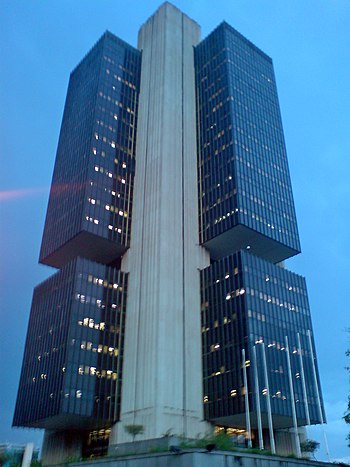Portal:Business
The Business and Economics Portal Business is the practice of making one's living or making money by producing or buying and selling products (such as goods and services). It is also "any activity or enterprise entered into for profit." A business entity is not necessarily separate from the owner and the creditors can hold the owner liable for debts the business has acquired. The taxation system for businesses is different from that of the corporates. A business structure does not allow for corporate tax rates. The proprietor is personally taxed on all income from the business. A distinction is made in law and public offices between the term business and a company such as a corporation or cooperative. Colloquially, the terms are used interchangeably. (Full article...) Economics (/ˌɛkəˈnɒmɪks, ˌiːkə-/) is a social science that studies the production, distribution, and consumption of goods and services. Economics focuses on the behaviour and interactions of economic agents and how economies work. Microeconomics analyses what's viewed as basic elements in the economy, including individual agents and markets, their interactions, and the outcomes of interactions. Individual agents may include, for example, households, firms, buyers, and sellers. Macroeconomics analyses the economy as a system where production, distribution, consumption, savings, and investment expenditure interact, and factors affecting it: factors of production, such as labour, capital, land, and enterprise, inflation, economic growth, and public policies that have impact on these elements. (Full article...) Selected articleRichard Cantillon (1680s – May 1734) was an Irish-French economist and author of Essai sur la Nature du Commerce en Général (Essay on the Nature of Trade in General), a book considered by William Stanley Jevons to be the "cradle of political economy". Although little information exists on Cantillon's life, it is known that he became a successful banker and merchant at an early age. His success was largely derived from the political and business connections he made through his family and through an early employer, James Brydges. During the late 1710s and early 1720s, Cantillon speculated in, and later helped fund, John Law's Mississippi Company, from which he acquired great wealth. However, his success came at a cost to his debtors, who pursued him with lawsuits, criminal charges, and even murder plots until his death in 1734. Selected image
Selected economyThe economy of the Netherlands is a highly developed market economy focused on trade and logistics, manufacturing, services, innovation and technology and sustainable and renewable energy. It is the world's 18th largest economy by nominal GDP and the 28th largest by purchasing power parity (PPP) and is the fifth largest economy in European Union by nominal GDP. It has the world's 11th highest per capita GDP (nominal) and the 13th highest per capita GDP (PPP) as of 2023 making it one of the highest earning nations in the world. Many of the world's largest tech companies are based in its capital Amsterdam or have established their European headquarters in the city, such as IBM, Microsoft, Google, Oracle, Cisco, Uber, Netflix and Tesla. Its second largest city Rotterdam is a major trade, logistics and economic center of the world and is Europe's largest seaport. Netherlands is ranked fifth on global innovation index and fourth on the Global Competitiveness Report. The Netherlands has a prosperous and open economy, which depends heavily on foreign trade. The economy is noted for stable industrial relations, fairly low unemployment and inflation, a sizable current account surplus (which, compared to the size of the country, is even more than Germany) and an important role as a European transportation hub; Rotterdam is the biggest port in Europe; and Amsterdam has one of the biggest airports in the world. Industrial activity is predominantly in food processing, chemicals, petroleum refining, high-tech, financial services, the creative sector and electrical machinery. Its highly mechanized agricultural sector employs no more than 2% of the labor force but provides large surpluses for the food-processing industry and for exports. The Netherlands, along with 11 of its EU partners, began circulating the euro currency on 1 January 2002. (Full article...) Selected quote"The process of substitution, of which we have been discussing the tendencies, is one form of competition; and it may be well to insist again that we do not assume that competition is perfect. Perfect competition requires a perfect knowledge of the state of the market; and though no great departure from the actual facts of life is involved in assuming this knowledge on the part of dealers when we are considering the course of business in Lombard Street, the Stock Exchange, or in a wholesale Produce Market; it would be an altogether unreasonable assumption to make when we are examining the causes that govern the supply of labour in any of the lower grades of industry. For if a man had sufficient ability to know everything about the market for his labour, he would have too much to remain long in a low grade. The older economists, in constant contact as they were with the actual facts of business life, must have known this well enough; but partly for brevity and simplicity, partly because the term "free competition" had become almost a catchword, partly because they had not sufficiently classified and conditioned their doctrines, they often seemed to imply that they did assume this perfect knowledge." TopicsRelated WikiProjectsDid you know (auto-generated) -
On this day in business history
General imagesThe following are images from various business-related articles on Wikipedia.
More did you know
Business news Wikinews Economy and business portal
|






































